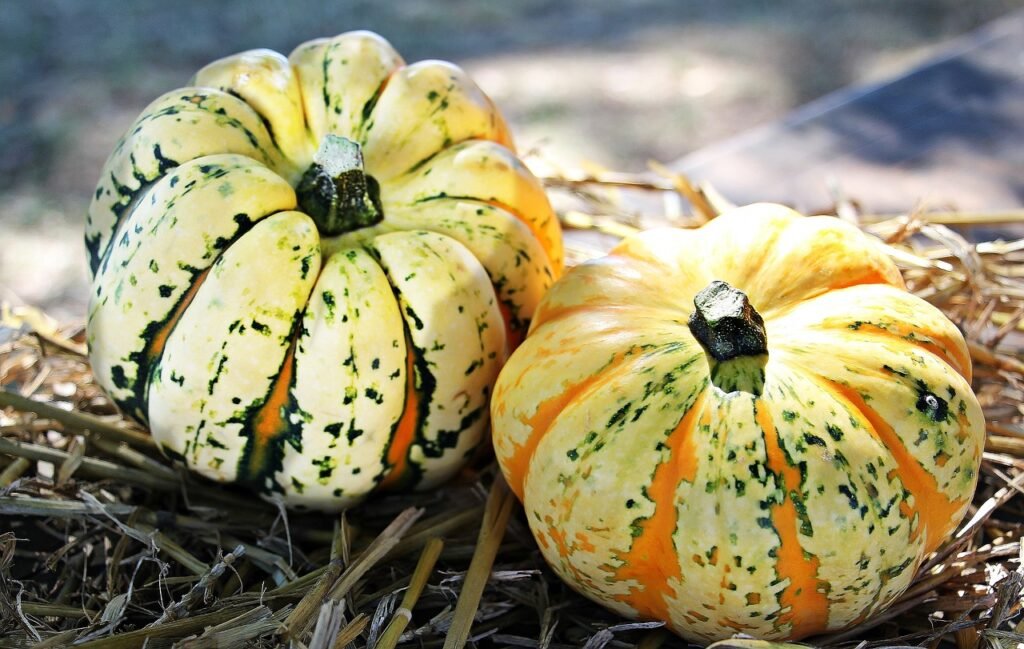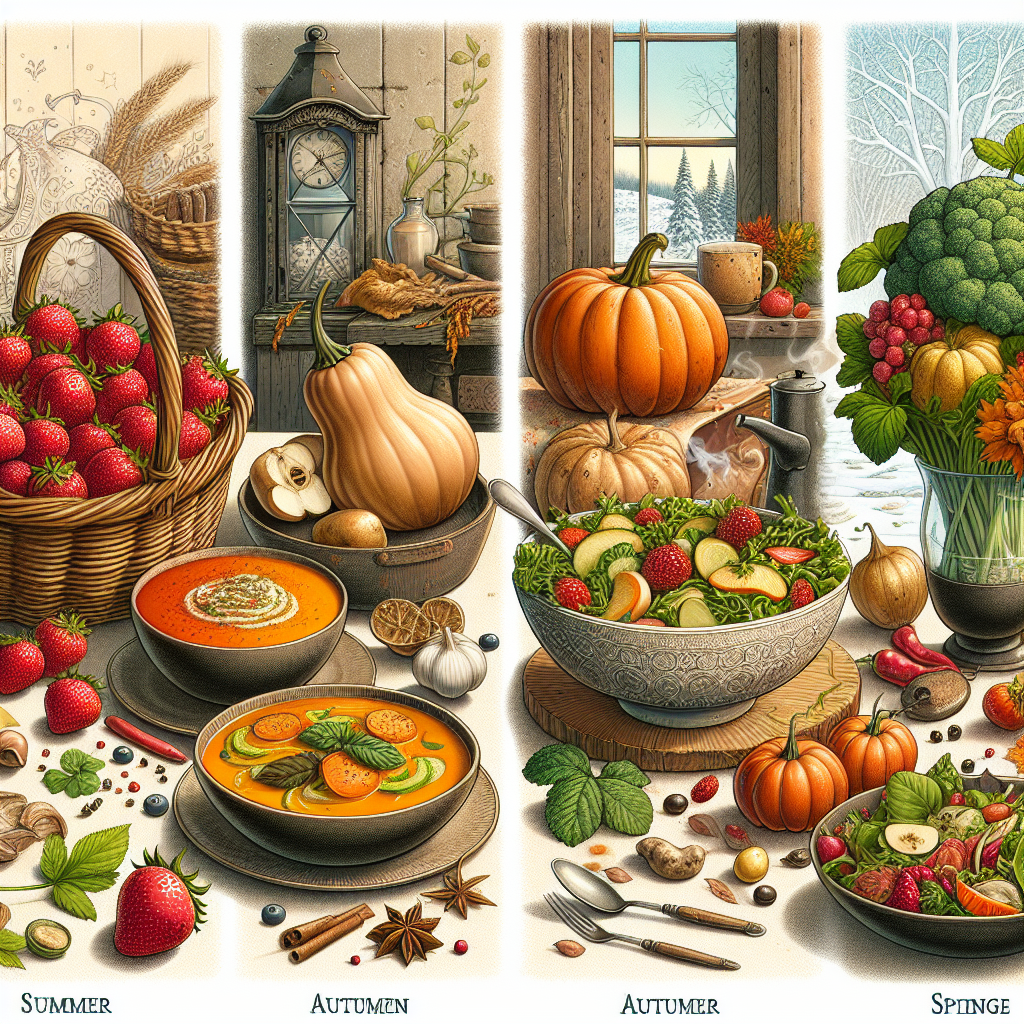Hey there! Are you ready to embark on a culinary adventure and discover the 4 seasonal foods that will tantalize your taste buds? From vibrant summer berries bursting with sweetness to hearty fall root vegetables, this article is here to guide you through the wonders of nature’s bounty. Get ready to explore the flavors of each season and uncover the delicious gems that await you. So, are you curious to know what these 4 seasonal foods are? Let’s dive right in!

Benefits of Seasonal Eating
Eating seasonal foods not only satisfies your taste buds with the freshest and most flavorful ingredients but also provides numerous benefits for your health, the environment, and local communities. By making a conscious choice to incorporate seasonal foods into your diet, you can enjoy a wide range of essential nutrients, support local farmers, and indulge in delicious flavors throughout the year. Let’s explore the many advantages of embracing seasonal eating.
Eating seasonal foods provides essential nutrients
When you enjoy seasonal foods, you are providing your body with a diverse array of essential nutrients. Fruits and vegetables that are in season are often harvested at their peak ripeness, ensuring that they are packed with vitamins, minerals, and antioxidants. These beneficial compounds are at their highest levels when the produce is consumed shortly after harvest, maximizing their nutritional value.
Furthermore, seasonal foods tend to be fresher and have a shorter journey from farm to table. This means that they retain a higher nutritional quality as compared to produce that goes through long transportation and storage times. So, by choosing seasonal foods, you are fueling your body with the nourishment it needs to thrive.
Seasonal foods support local farmers and the environment
Opting for seasonal foods is a fantastic way to show support for local farmers and the environment. When you choose to buy produce that is in season, you are directly supporting local farmers and their livelihoods. By purchasing their goods, you help these hardworking individuals sustain their businesses and contribute to the local economy.
Additionally, seasonal eating promotes sustainability and reduces the carbon footprint associated with food transportation. When you consume foods that are in season, they are often sourced locally, which means they do not need to be shipped long distances or stored for prolonged periods. This significantly reduces greenhouse gas emissions and energy consumption, helping to protect our planet.
Seasonal foods are more flavorful and delicious
One of the most delightful benefits of seasonal eating is the burst of flavor that accompanies each bite. When you consume seasonal foods, you are indulging in produce that has been allowed to fully ripen on the plant, soaking up all the natural sugars and flavors along the way.
The taste of seasonal fruits and vegetables is unparalleled – just imagine the juicy sweetness of a ripe summer watermelon or the earthy richness of a freshly harvested butternut squash. These flavors cannot be replicated with out-of-season produce, which is often picked before it is fully ripe and artificially ripened during transportation.
Now that we understand the numerous benefits of seasonal eating, let’s dive into the specific seasonal foods that you can enjoy during each season.
Spring Seasonal Foods
Asparagus
Asparagus is a vibrant and delicious vegetable that boasts a unique combination of crunchiness and tenderness. This spring delicacy is not only delightful to the taste buds but also packed with nutrients. Asparagus is an excellent source of fiber, folate, vitamins A, C, E, and K, as well as minerals like iron and potassium. It is also known to have anti-inflammatory properties and can support healthy digestion.
Strawberries
Nothing says spring like the arrival of plump and luscious strawberries. Bursting with sweetness, these vibrant red berries are not only a delicious treat but also a nutritional powerhouse. Strawberries are rich in antioxidants, vitamin C, manganese, and dietary fiber. They also offer numerous health benefits, including improved heart health, reduced blood pressure, and enhanced immune function.
Spinach
Spinach, with its delicate leaves and vibrant green color, is another iconic springtime vegetable. Low in calories but high in essential nutrients, spinach is a versatile ingredient that can be enjoyed in a variety of dishes. Packed with vitamins A, C, K, and folate, as well as minerals like iron and magnesium, spinach supports healthy bones, aids in digestion, and contributes to overall well-being.
Peas
Fresh peas are a delightful springtime treat that adds a burst of sweetness and a satisfying crunch to any dish. These tiny green gems are not only delicious but also offer a range of health benefits. Peas are an excellent source of fiber, vitamins A, C, and K, and minerals like manganese and potassium. They are known to support healthy digestion, promote heart health, and boost immune function.

Summer Seasonal Foods
Watermelon
As the temperatures rise, nothing beats the refreshing and hydrating qualities of a juicy watermelon. This summer fruit is not only incredibly delicious but also incredibly good for you. Watermelon is over 90% water, making it an excellent thirst quencher and a fantastic way to stay hydrated during hot summer days. It is also a rich source of vitamins A and C, as well as lycopene, an antioxidant associated with heart health and reduced inflammation.
Tomatoes
During the summer months, tomatoes are at their peak of flavor and juiciness. These versatile fruits (often mistaken for vegetables) come in a variety of colors and sizes, each with its own unique flavor profile. Tomatoes are rich in vitamins A, C, and K, as well as potassium and dietary fiber. They offer numerous health benefits, including improved heart health, reduced risk of certain cancers, and enhanced skin health.
Corn
Corn, with its golden kernels, is an iconic summer staple that can be enjoyed in countless ways. Whether grilled on the cob, added to salads, or transformed into a creamy corn chowder, this versatile grain adds a delicious sweetness to any dish. Corn is a good source of fiber, vitamin C, and folate. It also contains antioxidants and various beneficial plant compounds that support eye health and proper digestion.
Blueberries
Blueberries are a true summer delight, bursting with sweetness and vibrant color. These small, nutrient-dense berries are a powerhouse of antioxidants, vitamins A and C, and dietary fiber. With their impressive health benefits, including improved brain function, reduced risk of heart disease, and enhanced eye health, blueberries are a fantastic fruit to incorporate into your summer menu.
Autumn Seasonal Foods
Apples
With the arrival of autumn, an abundance of crisp and juicy apples graces the shelves. Apples come in a variety of flavors and textures, making them a versatile fruit for both sweet and savory dishes. These delightful fruits are not only delicious but also incredibly nutritious. Apples are an excellent source of fiber, vitamins C and A, and antioxidants. They promote healthy digestion, support immune function, and contribute to heart health.
Pumpkin
Autumn wouldn’t be complete without the rich, earthy flavors of pumpkin. From pumpkin pie to hearty soups and creamy risottos, this versatile orange vegetable adds a comforting touch to any dish. Beyond its delightful taste, pumpkin is packed with nutrients. It is rich in vitamins A, E, and C, as well as dietary fiber and potassium. Pumpkin is also known for its role in promoting eye health and supporting immune function.
Brussels sprouts
Brussels sprouts, with their miniature cabbage-like appearance, are a beloved autumn vegetable that often takes center stage on holiday tables. These cruciferous vegetables are not only cute but packed with nutrients as well. Brussels sprouts are an excellent source of vitamins K and C, folate, and dietary fiber. They are known for their potential to protect against certain types of cancers, support heart health, and contribute to strong bones.
Butternut squash
Butternut squash, with its sweet and nutty flavor, is another autumn favorite that adds warmth to a variety of dishes. Whether roasted, pureed into soups, or used as a filling for ravioli, this versatile vegetable never fails to impress. Butternut squash is an excellent source of vitamins A and C, as well as dietary fiber and potassium. It supports eye health, boosts immune function, and promotes healthy digestion.

Winter Seasonal Foods
Citrus fruits
As the chilly winter months arrive, citrus fruits bring a burst of sunshine and tanginess to our plates. From oranges and grapefruits to lemons and limes, these zesty fruits are not only refreshing but also loaded with essential vitamins and antioxidants. Citrus fruits are an excellent source of vitamin C, which plays a crucial role in supporting the immune system and fighting off cold and flu symptoms. They also provide dietary fiber and contribute to heart health.
Kale
Kale, with its hearty leaves and dark green color, is a nutritional powerhouse that thrives in the winter months. This leafy green is packed with vitamins A, C, and K, as well as minerals like calcium and iron. Kale boasts numerous health benefits, including improved bone health, enhanced digestion, and reduced inflammation. Whether used in salads, smoothies, or stir-fries, kale is a fantastic addition to your winter meals.
Root vegetables
During the winter, root vegetables reign supreme, adding warmth and earthiness to our dishes. Carrots, beets, turnips, and parsnips are just a few examples of the wide variety of root vegetables available during this season. Root vegetables are rich in vitamins A and C, dietary fiber, and antioxidants. They offer numerous health benefits, including improved digestion, enhanced immune function, and heart health support.
Pomegranate
Pomegranates, with their jewel-like seeds, are a delightful winter fruit that adds a burst of sweetness and tanginess to any dish. These vibrant fruits are not only tasty but also incredibly nutritious. Pomegranates are rich in antioxidants, vitamins C and K, as well as dietary fiber. They offer a range of health benefits, including reduced inflammation, improved heart health, and potential cancer-fighting properties.
Tips for Incorporating Seasonal Foods into Your Diet
Now that you know the fantastic benefits and delicious options available with seasonal eating, here are some practical tips to help you incorporate seasonal foods into your daily meals:
Visit your local farmers market
Exploring your local farmers market is an excellent way to discover the freshest and most diverse selection of seasonal produce. Not only will you be supporting local farmers and the community, but you’ll also have the opportunity to engage with them directly and learn about their farming practices. Grab a basket and let the vibrant colors and enticing aromas guide your choices.
Join a Community Supported Agriculture (CSA) program
By joining a Community Supported Agriculture (CSA) program, you can enjoy a regular supply of seasonal produce directly from local farms. CSA programs typically allow you to subscribe and receive a box of fresh, locally grown fruits and vegetables on a weekly or biweekly basis. This not only ensures that you have access to seasonal foods regularly but also provides a wonderful opportunity to try new and adventurous ingredients.
Plan your meals around seasonal ingredients
Consider planning your meals based on the seasonal produce available. Start by choosing a few seasonal ingredients that inspire you and build your meals around them. Whether it’s a vibrant salad, a comforting soup, or a delicious stir-fry, let the flavors of the season guide your culinary creations. Not only will you be enjoying the freshest ingredients, but you’ll also be amazed at the depth of flavors and the variety of dishes you can create.
Experiment with new recipes and flavors
Seasonal eating opens up a world of culinary exploration and exciting flavor combinations. Challenge yourself to try new recipes and experiment with different ingredients. Look for inspiration in cookbooks, online recipe websites, or food blogs. Don’t be afraid to get creative in the kitchen and adapt recipes to suit your taste preferences. The more you experiment, the more you’ll discover the joy of exploring different seasonal foods and flavors.

Conclusion
Embracing seasonal eating is not only a delightful way to discover new flavors but also a fantastic way to support your health, local farmers, and the environment. By opting for seasonal foods, you can enjoy the freshest and most nutrient-packed ingredients while reducing your carbon footprint and contributing to the local economy. So, take a trip to your local farmers market, join a CSA program, and dive into the world of seasonal foods. Let the changing seasons guide your culinary adventures and discover the joy of exploring different seasonal foods throughout the year.

